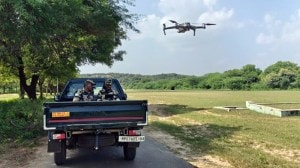Airport scanners to look in the eye, size you up
Finger-printing is passe. So is physical verification of photographs. In the future, sophisticated equipment installed at airports and secur...

Finger-printing is passe. So is physical verification of photographs. In the future, sophisticated equipment installed at airports and security establishments will look into your eyes and identify you.
The Indian Home Ministry and the Civil Aviation authorities are bringing in the latest technology in bio-metrics to fight terrorism. Under a pilot project to be undertaken at Mumbai and Delhi airports, sophisticated eye scanners and other equipment would be installed to intercept criminals and terrorists, said Minister of State for Civil Aviation Shirpad Naik.
During an interview, the minister said this technology would help authorities intercept persons travelling on forged passports. The decision was taken after authorities noted a rise in the number of drug seizures at the airports. At Mumbai airport alone, 40 Nigerians were nabbed last year carrying drugs, some of them travelling on forged passports.
Naik said that the government is conducting feasibility studies on use of various equipment and the pilot project would be kicked off soon. For the project, the government has shortlisted suppliers and technology providers who are being evaluated, Naik said.
Security experts say biometrics is being increasingly used in developed countries where the voice, eyes and faces of criminals and terrorists are scanned into retrieval systems. This is in addition to the finger-printing technology currently in use. This data is then assessed in real-time from a database to providing support to law enforcement agencies, according to experts.
Bio-metrics technology is also becoming popular among employers and companies that require a high-level of workplace security. Employees have to get their voice, fingers, eyes, or faces scanned across a screen to clock on and off shifts, get access to work areas, or access a secure website.
On a different note, Naik said that the Central Industrial Security Force (CISF) has taken over security in 40 of the 70 airports across the country. The CISF will soon take over security at the remaining airports too.
So far security at the airports were undertaken by local police and other agencies like the Bureau of Civil Aviation Security. The government feels handing over security to a single agency would make for better co-ordination.
Photos





- 01
- 02
- 03
- 04
- 05

























